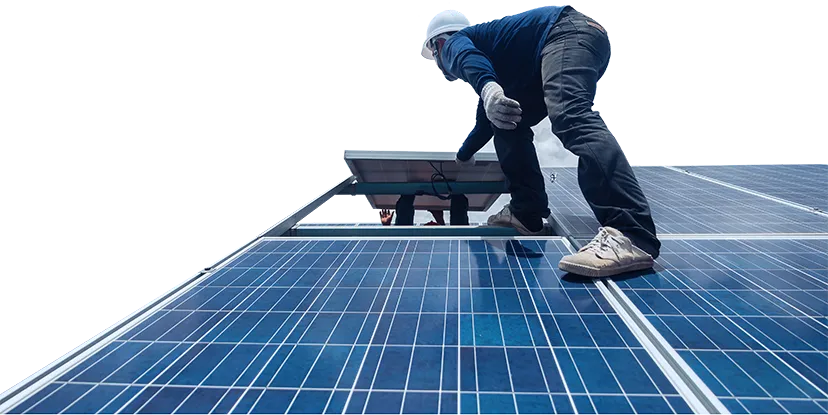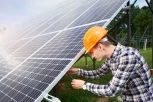10 tips for solar panel repair in an industrial setup

Solar power is an efficient, sustainable energy solution for businesses looking to reduce operating costs and enhance their environmental responsibility. However, like any technology, solar panels can experience wear and tear over time, especially in industrial or commercial settings. Ensuring timely and effective repairs is crucial for maintaining system performance, prolonging the lifespan of equipment, and maximizing energy savings. Here are 10 essential tips for solar panel repair in commercial and industrial environments
Conduct Regular Inspections
Frequent inspections are key to identifying issues early on. Solar panels in industrial setups are often exposed to harsher conditions, such as extreme weather, dust, and debris, which can lead to damage. Use drones or automated systems to inspect hard-to-reach panels, and consider using infrared imaging to identify hot spots that indicate potential electrical faults or damage.
2. Ensure Proper Cleaning
Accumulation of dirt, leaves, or snow can significantly reduce the efficiency of your solar panels. Regular cleaning is crucial, but it must be done carefully to avoid damaging the panels. Use a soft brush or specialized cleaning tools, and avoid harsh chemicals that may degrade the surface of the panels. For large industrial setups, consider hiring professional cleaning services.
3. Check for Electrical Issues
Electrical problems are one of the most common causes of solar panel malfunctions. In commercial setups, the electrical systems are typically more complex, which means more opportunities for faults. Regularly check the inverter, connections, and junction boxes for any signs of wear or corrosion. Use a multimeter to check for faulty wiring and ensure the system is properly grounded.
4. Monitor System Performance
In industrial settings, you can take advantage of advanced solar monitoring systems to track real-time performance and identify anomalies. These systems can alert you to any dips in energy production, such as issues with individual panels, inverters, or batteries. Prompt action based on these alerts can save time and money by preventing more significant damage.
5. Inspect the Mounting System
The mounting system secures your solar panels to the roof or ground, and any weakness here can cause damage to both the panels and the building structure. Inspect the mounting hardware for signs of corrosion or loosening over time, especially in environments prone to high winds or seismic activity. Tighten bolts and replace any worn-out materials to ensure structural integrity.
6. Check for Microcracks
Solar panels can develop microcracks in the glass or solar cells that may not be visible to the naked eye but can reduce overall system performance. Regularly check for any signs of discoloration, which could indicate microcracks. If detected, consult a professional to replace the damaged panels before the issue worsens and affects the entire system.
7. Address Inverter Problems
The inverter is the heart of the solar power system, converting DC power into AC. If the inverter fails or operates inefficiently, the whole system’s performance is compromised. Check for error codes and ensure the inverter is operating within optimal temperature ranges. Many modern inverters come with built-in monitoring features that can alert you to issues such as overloads, temperature extremes, or electrical faults.
8. Ensure Proper Drainage
Water accumulation on panels or beneath the mounting system can cause long-term damage, particularly in commercial and industrial settings where the scale of installation increases the potential for water-related issues. Ensure that panels are installed with proper drainage in mind and that gutters or drainage systems are not clogged. This will help prevent water damage and electrical short circuits.
9. Use Qualified Technicians for Repairs
Solar panel repairs in commercial and industrial setups should always be handled by professionals. Technicians with expertise in solar energy systems are equipped to handle complex issues safely and efficiently. Look for a qualified, licensed technician with a proven track record in commercial solar systems, as the equipment and wiring may differ significantly from residential setups.
10. Plan for Ongoing Maintenance
A proactive maintenance plan can help extend the lifespan of your solar system and minimize downtime. Establish a routine schedule for inspections, cleaning, and system checks to address minor issues before they turn into major problems. Include replacement timelines for key components such as inverters and batteries to prevent unexpected failures.
Solar panel repairs in industrial or commercial settings require a balance of technical expertise, routine maintenance, and careful observation of system performance. By implementing these tips, businesses can keep their solar systems running efficiently and continue to reap the long-term benefits of reduced energy costs and enhanced sustainability. Regular maintenance and repairs will not only save on costly replacements but will also contribute to a business’s environmental goals.






